

The True Cost of the Royal Family Explained. This is how to explain Brexit to your children. 1/50 5 March 2018 Gary Oldman, winner of the Best Actor award for 'Darkest Hour,' poses with his award in the press room during the 90th Annual Academy Awards at Hollywood & Highland Center.

Getty 2/50 4 March 2018 Great Britain's Andrew Pozzi celebrates winning the men's 60m hurdles final as Aries Merritt of United States looks dejected during the IAAF World Indoor Championships at Arena Birmingham. Getty/IAAF 3/50 3 March 2018 People playing with their sledges in Greenwich Park, east London, as the cold weather continues around the country. PA 4/50 2 March 2018 Theresa May delivers a speech about her vision for Brexit at Mansion House.
Brexit explained: what happens when the UK leaves the EU? UK and the EU: Better off out or in? Pros and Cons of leaving the EU – All the info you need for the EU referendum. We only have 120 days until the EU referendum on June 23, and the mixed messages are already coming in thick and fast.

ICYMI, David Cameron secured a deal on Friday night that would change some of the particulars of our membership with the EU. You can read more about that here. Since then, pro-Brexiter Michael Gove has said the deal wouldn’t be legally binding – although this claim was swiftly shut down by both 10 Downing Street and the Attorney General Jeremy Wright. So, the political ping pong is well underway. But who should we believe? Obviously this is a personal decision – and one that should be based on facts.
Economic costs Some estimates suggest the total economic cost of EU membership is around 11 per cent of our annual GDP – which makes it something like £200billion. Brexiters say this money would be better spent on new British industries and scientific research. EU referendum pros and cons: Should Britain vote to leave Europe? On 23 June 2016, the UK settled the question that had rumbled under the surface of British politics for a generation: should the country remain within the European Union or end its 40-year membership and go it alone?
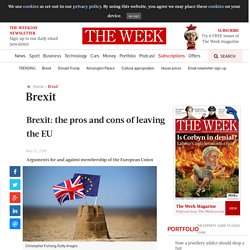
Or so it seemed when just under 52 per cent of voters opted for Brexit. Britain celebrating 40 years of punk music. A Brief History of Punk Music. The beginnings of punk rock are often furiously debated.
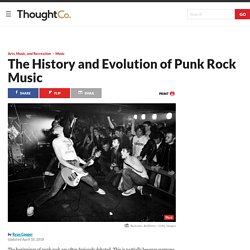
This is partially because everyone has a different definition of punk rock, and partially because its foundation stones are found in several places. The Foundations of Punk Rock "Punk Rock" was originally used to describe the garage musicians of the '60's. Bands like the Sonics were starting up and playing out with no musical or vocal instruction, and often limited skill. London 2: A Penny for the Yard. The Lady Not For Turning. Best 2017 Documentary Churchill Biography - The Life and Times of Winston Churchill. The History Of The British Empire. An Englishman Plays Risk - Foil Arms and Hog. The British Empire Timeline. British Empire in Colour. Heritage is GREAT - Part 2. Canterbury and Exeter cathedrals also boast magnificent architecture and attract visitors from around the world.

Some historic treasures date back even further. Stonehenge… This giant circle of stones stands out as one of Britain’s most famous and visited historical sites. Dating back thousands of years, its origins still remain a mystery and that's why it’s still so popular. Susan Greaney is a historian. Richard: Susan, what is Stonehenge? Winston Churchill Documentary - The Lion's Roar. Why the US Should Look to the Leadership of Churchill and Thatcher. iWonder - Sir Winston Churchill: The greatest Briton?
Winston Churchill: greatest British hero or a warmongering villain? Sir Winston Churchill, a journalist, a soldier, and a war-time leader, was a maverick who divided opinion throughout his lengthy political career.
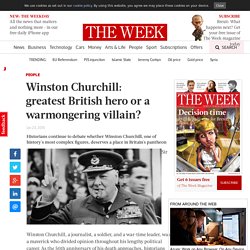
As the 50th anniversary of his death approaches, historians and journalists appear no closer to agreeing on his legacy. We weigh up the leading arguments on both sides. Churchill as hero: Not his finest hour: The dark side of Winston Churchill. Winston Churchill is rightly remembered for leading Britain through her finest hour – but what if he also led the country through her most shameful hour?
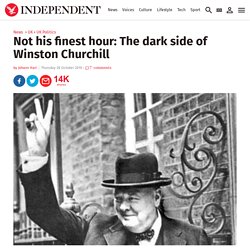
What if, in addition to rousing a nation to save the world from the Nazis, he fought for a raw white supremacism and a concentration camp network of his own? This question burns through Richard Toye's new history, Churchill's Empire, and is even seeping into the Oval Office. Elizabethan theater: Shakespeare and The Globe. Life and Times of England's Greatest Playwright. William Shakespeare is often called the world’s greatest playwright.

He wrote comedies, tragedies and historical plays in England in the last part of the 16th and the early 17th century. William Shakespeare was born in 1564 in the English town of Stratford-upon-Avon. His father was a businessman and the town’s mayor. His mother came from a family that owned land near Stratford. William had three younger brothers and two younger sisters. Like other boys of middle-class families, William attended a grammar school in Stratford where he got a good education and also learned Latin. When William was 18 he married Anne Hathaway. We don’t really know what William did during the following years but in 1592 he went to London to work as an writer and actor. From 1592 to 1594 the Black Death spread across England. Theatre in the Age of Shakespeare. The theatre in Shakespeare’s time was much different than it is today.
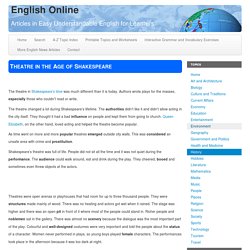
Authors wrote plays for the masses, especially those who couldn’t read or write. The theatre changed a lot during Shakespeare’s lifetime. The authorities didn’t like it and didn’t allow acting in the city itself. They thought it had a bad influence on people and kept them from going to church. Queen Elizabeth, on the other hand, loved acting and helped the theatre become popular. As time went on more and more popular theatres emerged outside city walls. Ten ways in which Shakespeare changed the world. Back in 2012, the British Library displayed a rare book that attracted as much media attention as a Gutenberg Bible.
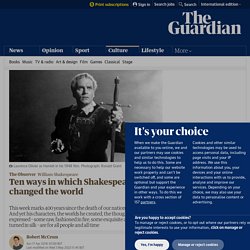
It was a mass-produced edition of a text once owned by Nelson Mandela, inked with his pen. Mandela had kept this volume by his bedside for more than 20 years and it had sustained him through his darkest hours on Robben Island. Sometimes he had read aloud from it to his cellmates. It was not scripture, but its sacred characters – from Hamlet to Prospero – had often been a source of inspiration. Mandela, son of a Xhosa chief, was born and grew up in Transkei, 6,000 miles from Britain. That heartfelt response is, perhaps, Shakespeare’s most astonishing achievement. 400 Years After His Death, Shakespeare Still Popular.
This spring marks the 400th anniversary of the death of British playwright William Shakespeare. His plays have had a major influence on the world’s literature and drama. That influence is shown in a new exhibit at Folger Shakespeare Library in Washington, DC. Shakespeare was born in 1564 in the small town of Stratford-upon-Avon, about 160 kilometers from London. People all around the world still read his plays. His works have been translated into hundreds of languages. S es anglais lv1 2012 metropole remplacement sujet officiel. S es anglais lv1 2012 metropole remplacement corrige officiel. Referendum on abolishing monarchy must be held when Queen dies, republicans demand. 1/50 Queen Elizabeth II Queen Elizabeth II on a walk-about in Portsmouth during her Silver Jubilee tour of Great Britain, 1977 2/50 Queen Elizabeth II The future Britain's Queen Elizabeth II (R) pictured with her younger sister Princess Margaret (L) in 1933 AFP/Getty Images) 3/50 Queen Elizabeth II The 9-year-old Elizabeth attends an aristocratic wedding with her mother and younger sister.
Introduction - The British Monarchy, an obsolete system? Elisabeth II (Born in 1926) During the Middle-Age, almost all countries were Monarchies and throughout History, monarchies have tend to disappear: the French abolished theirs in the 18th,, and a couple centuries later, almost all the monarchies of Europe were gone: they became Parliamentary Monarchies, Republics... Nowadays, there are only a few monarchies left. The British Monarchy was created more than a thousand years ago. It is a well known institution and it has always been, ever since its creation. Why does the UK love the monarchy? I have recently been accused on Twitter of being both a royalist "uber-Toady" and the author of "the most anti-monarchist report you could want to view".
Both tweets related to the same item, a report for the BBC News at Ten that tried to answer a straightforward question: why does a country that has become so cynical about other institutions (Parliament, the City, the press, the police) remain so loyal to the monarchy? Whatever republicans might wish, less than a fifth of the Queen's subjects in the UK say they want to get rid of the Royal Family - a proportion that has barely changed across decades. According to polling data from Ipsos Mori, support for a republic was 18% in 1969, 18% in 1993, 19% in 2002 and 18% last year. Referendum on abolishing monarchy must be held when Queen dies, republicans demand.
Explicit cookie consent. On September 9th, Queen Elizabeth II will become the longest-serving monarch in Britain's history. Below, three Economist writers argue for different futures for the British crown. The case against the monarchyThe case for the monarchyThe case for modest reform The case against the monarchy CEASE campaigning, Hillary Clinton; get back to business, Donald Trump: America’s 2016 election has been cancelled. Brief History of the Royal Family. Ding Dong! The Witch Is Dead enters chart at two.
Ding Dong! MARGARET THATCHER - Death of a Revolutionary - CH4. Margaret Thatcher: why is she still so demonised? The most mainstream voice to be heard in this mob was that of Radio 4 regular Mark Steel, who tweeted: “what a terrible shame – that it wasn’t 87 years earlier.” In the chorus was Socialist Worker – circulation under 8,000 and admittedly probably not on order at Mark or Carol Thatcher’s newsagents – with a front-page mock-up of her tombstone and the word “Rejoice” in capital letters. Ajit Vadakayil: MARGARET THATCHER HENCHWOMAN OR HEROINE – CAPT AJIT VADAKAYIL. Margaret Thatcher passed away on 8th April 2013 at the age of 87, due to a stroke ( dementia and Alzheimer disease complications ). I wanted to write this post on 9th April, but I decided that I will wait till 14th April to allow the mourning period to get over -- who ever wants to mourn her death.
This is part of my culture. iWonder - Margaret Thatcher: From grocer’s daughter to Iron Lady.